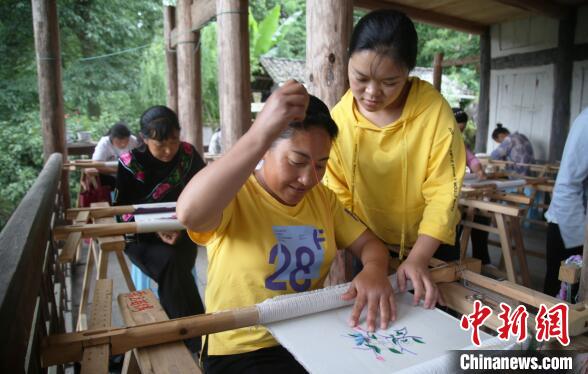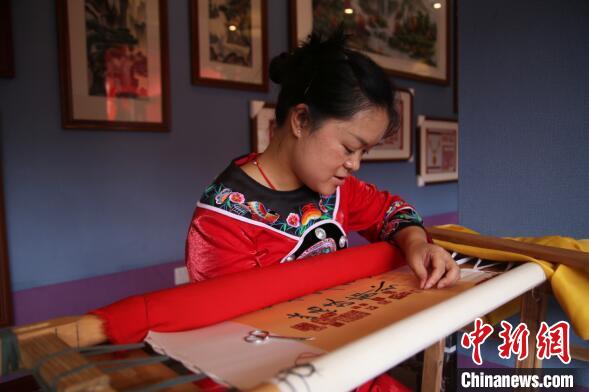

A female embroiderer carefully reproduces a famous calligraphy work by Huang Tingjian, an artist and poet in China’s Northern Song Dynasty (960-1127), on a piece of cloth.

Zhang Xiaorong (right) teaches a woman embroidery skills. Photo/Chinanews.com)
The work is 11 meters long and consists of more than 600 Chinese characters, and is expected to take at least half a year to complete.
“It’s so hot. Just take a rest if you’re tired,” Li Shaoyu, technical director of a company that sells Miao embroidery products, said to Zhang Xiaorong, the embroiderer.
“I’m fine. Just one more character,” Zhang replied, as she continues to concentrate on her stitching.
Zhang, who is from Xikou village, Baojia township, Pengshui Miao and Tujia autonomous county of southwest China’s Chongqing municipality, has been an employee of the company, run by Li and her husband, since last year.
After getting through the difficulties caused by the COVID-19 pandemic, Zhang has become a trainer teaching people embroidery skills, while the company has received more and bigger orders.
In 2018, Zhang’s family slipped back into poverty when her husband suffered a serious illness. As she was worrying about how to make a living, she received a phone call from Xiang Guohui, a local official who was designated to help Zhang’s family shake off poverty.
Xiang told Zhang that a company was running training classes teaching people embroidery skills, and asked if she was interested in joining.
“I said ‘yes’ without the least hesitation,” Zhang said, as she had seen her mother embroidering and had been interested in the handicraft since she was young. Besides, she had also been thinking about learning some practical skills that she could use to free her family from poverty at that time.

Zhang Xiaorong. (Photo/Chinanews.com)
Since the class had been organized with the support of the local government, students were able to learn skills for free and were provided free food and accommodation during the training.
As a diligent student and a gifted embroiderer, Zhang quickly caught the attention of Li, who was then the teacher of the training class. As soon as the training ended, Li asked Zhang to work as an embroiderer for her company and promised to give her flexible working hours, as she still needed to take care of her husband and children.
Zhang joined the company in April 2019, and became one of its best workers. As she was reliable, hard-working and always efficiently produced high-quality work, Zhang was made the manager of one of the company’s shops at a tourist attraction shortly after she was employed there.
However, just as everything seemed to be looking up, the COVID-19 epidemic dealt a severe blow to various industries across the country.
“Our company couldn’t get orders. I was a little worried, since I didn’t have any work to do and had to stay at home,” Zhang recalled, saying that she was worried that her company might have to lay off workers or even face closure.
To ease the anxieties of the embroiderers at her company, Li made phone calls to every worker reminding them to try not to go outside, and ordered more than 20,000 yuan ($2,880) worth of face masks from another city and had them sent to every employee’s home.
In order to help employees continue supporting their families, the company allowed people to work from home and paid them by the piece.
To everyone’s surprise, the company not only continued to pay their employees’ salaries every month, but even paid them half a month ahead of their pay day.
“We didn’t have any orders at that time, so we didn’t have to work. But considering that this period would be more difficult for our employees than for the company, we decided to continue with production. We were determined not to lay off any employees, unless they asked to leave voluntarily,” explained Li, who said that she and her husband had to borrow money from family and friends to pay their employees' salaries during the most difficult time of the pandemic.
Fortunately, as the country made positive achievements in the prevention and control of the pandemic, the company also managed to get out of its difficulties.
At the end of last April, the company received a new order for 200 sets of Miao ethnic clothes. Zhang was very excited about the order, and quickly completed her part of the job.
In order to bring greater diversity to the company’s products, Li had two college students design various cultural and creative items for the company during the COVID-19 outbreak and opened online stores on e-commerce platforms, which caught the attention of more young people and did a lot to expand the market for the company.
In addition, the local government provided constant support for the company, helping it tide over the difficult time by lowering the rate of added-value tax the company had to pay, encouraging the company’s landlord to reduce rent, and providing special funds for the company.
On June 8, the local county government allocated 800,000 yuan from its poverty relief fund for a training class organized by the company, allowing 80 people from local impoverished households to receive training as embroiderers.
“It was great news for us. As we’ll have more and more embroiderers, we will be able to take bigger orders in the future,” Li said happily.
Zhang, who has made great progress in her embroidery skills over the past year, volunteered to teach people embroidery at the training class.
And with encouragement from her company, she is also learning related theoretical knowledge so that she can prepare for the accreditation as assistant industrial artist from the local human resources and social security authorities.
 Fire brigade in Shanghai holds group wedding
Fire brigade in Shanghai holds group wedding Tourists enjoy ice sculptures in Datan Town, north China
Tourists enjoy ice sculptures in Datan Town, north China Sunset scenery of Dayan Pagoda in Xi'an
Sunset scenery of Dayan Pagoda in Xi'an Tourists have fun at scenic spot in Nanlong Town, NW China
Tourists have fun at scenic spot in Nanlong Town, NW China Harbin attracts tourists by making best use of ice in winter
Harbin attracts tourists by making best use of ice in winter In pics: FIS Alpine Ski Women's World Cup Slalom
In pics: FIS Alpine Ski Women's World Cup Slalom Black-necked cranes rest at reservoir in Lhunzhub County, Lhasa
Black-necked cranes rest at reservoir in Lhunzhub County, Lhasa China's FAST telescope will be available to foreign scientists in April
China's FAST telescope will be available to foreign scientists in April "She power" plays indispensable role in poverty alleviation
"She power" plays indispensable role in poverty alleviation Top 10 world news events of People's Daily in 2020
Top 10 world news events of People's Daily in 2020 Top 10 China news events of People's Daily in 2020
Top 10 China news events of People's Daily in 2020 Top 10 media buzzwords of 2020
Top 10 media buzzwords of 2020 Year-ender:10 major tourism stories of 2020
Year-ender:10 major tourism stories of 2020 No interference in Venezuelan issues
No interference in Venezuelan issues
 Biz prepares for trade spat
Biz prepares for trade spat
 Broadcasting Continent
Broadcasting Continent Australia wins Chinese CEOs as US loses
Australia wins Chinese CEOs as US loses